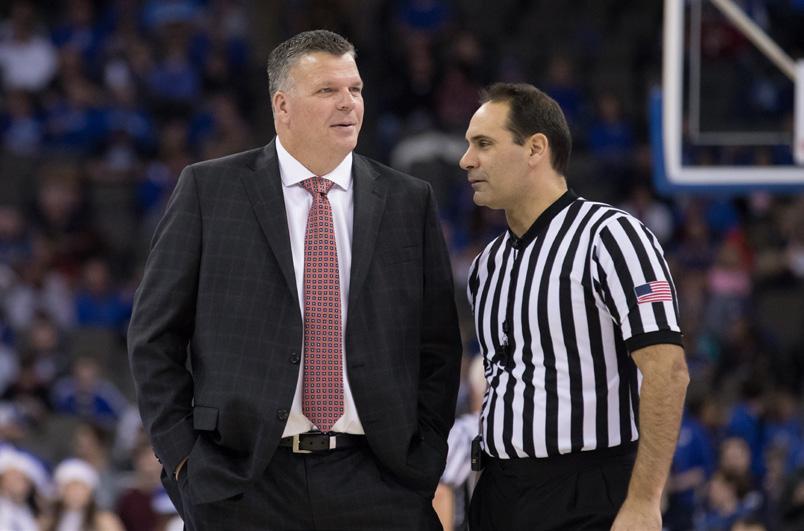
5 minute read
Improving The Coach-Official Relationship Begins With Mutual Understanding Andy Katz
Improving the Coach-Official Relationship Begins with Mutual Understanding
by Andy Katz
Advertisement
Officials aren’t loved by fans, coaches or players.
They are in a no-win situation. No one has much sympathy for their attempts to call a game and make split-second decisions, interpret the rules correctly and ensure the game is played smoothly.
But what they deserve is respect and to be given a fair chance to call the game.
The relationship between officials and coaches needs to improve. It’s never going to be a love fest, but there should at least be a common goal of wanting the game to go as scripted as best as possible.
The first way to get coaches to better relate to officials is to understand what they do on a gameby-game basis.
“These guys are professionals,’’ said JD Collins, the NCAA’s coordinator of officials. “They have a 90-percent accuracy rate or higher. We may miss a call, but we don’t miss 20 in a game.
“What officials desire is to get an equal amount of respect that the officials show to the coaches,’’ said Collins.
To bridge the gap that can be wide at times, Collins is hoping there is better communication.
Coaches want to be heard. But officials need to make sure they are listening.
“We do have room to grow in communicating well,’’ said Collins.
One collection of key personnel who have changed their opinion on officials are conference basketball coordinators — former coaches — who must deal with officials and coaches.
“Everyone should understand that the ultimate goal for both coaches and officials is perfection, which is an unattainable result,’’ said Rick Boyages, the Big Ten’s associate commissioner in charge of men’s basketball and the executive director of an officiating consortium.
“Student-athletes and officials are human,’’ said Boyages. “In a game with 120 to 140 possessions, they will make mistakes. It would be great if head coaches thought about incorrect officiating calls, or no-calls, the same way they think about studentathlete mistakes, team turnovers or even coaching errors. Officials are just as disappointed about their mistakes as student-athletes are about theirs, and everyone is striving for continuous improvement in a fast-moving, competitively-charged environment.”
Boyages would love for coaches to understand the skills needed to officiate.
“Coaches have a great feel for play-calling, but could really benefit from a better understanding of officiating mechanics such as positioning, rotations, signaling, and primary/secondary coverage areas,’’ said Boyages, a former head coach in the MAC and longtime assistant in the Big East and Big Ten. “I didn’t have a grasp of those officiating fundamentals during my coaching career and it led to unfair evaluations and expectations on my part.”
“Young officials and coaches could mutually benefit from improving communication and conflict resolution skills,” Boyages added.
Nate Pomeday, the men’s basketball administrator for the American Athletic Conference, said his perception changed when he had a better understanding of the type of work officials put into the pregame and postgame, and the amount
Charlie Brock Greg McDermott Leonard Hamilton


of rules they had to interpret and adjudicate in a split second.
“Before I was paranoid like every coach out there,’’ said Pomeday, a former longtime assistant coach in the Pac-12 and Big Ten. “Some veteran coaches understand when to turn it on and when to give ground. Some of the younger coaches seem to be a little calmer as they find their identity and grow their relationship with the officials, more strategic communication and not just yelling. Everyone has their own identity.”
Dan Leibovitz, the SEC’s associate commissioner for basketball, said he found out that what happens in the pregame officials’ locker room is similar to a coach’s pregame message in the locker room.
“Coaches want their teams to be great in fourminute segments,’’ said Leibovitz, a former head coach in the America East, former NBA assistant and assistant in the Ivy and A-10. “You hear it all the time. The irony is, in an officials’ locker room before the game, they are saying the exact same thing. ‘Let’s be great four minutes at a time and strive to be perfect down the stretch.’
“If you spend too much time obsessing about officiating it can become a real distraction,’’ said Leibovitz. “We have spent a great deal of time working to improve the communication and relationship between our coaches and officials. Officials must understand just how important each game is to student-athletes and coaches. They must be poised and professional on a consistent basis, while having an appreciation of a coach’s will to win.”
Leibovitz said having SEC officials come to the league meetings is a way to build bridges. That communication is exactly what Jeff Jackson has been stressing in the Big 12.
Jackson, who is the associate commissioner in the Big 12 overseeing men’s basketball and was a former head coach in the America East and assistant in the SEC, Pac-12, A-10, Ivy and MWC, said communication is the key.
“Communicating well when you make a bad call or a mistake is important,’’ said Jackson. “The guys who do that can create a more trusting relationship with the coaches.
Jackson is hoping coaches will come to officiating clinics in the fall before the season. Do that and the communication might improve.
There is lot of work to be done for both sides to come together. There is no reason for constant animosity. Understanding the pressures each side faces would help alleviate some of the misconceptions.
Communicating more during the offseason would help. Listening, not just hearing, by both sides and avoiding antagonistic behavior is a must.
There is no reason why the two sides can’t better understand each other and find a common goal — to ensure a clean, well-played, accuratelyofficiated game is always first.
Andy Katz is a college basketball analyst for the Big Ten Network and a college basketball correspondent for the NCAA.










